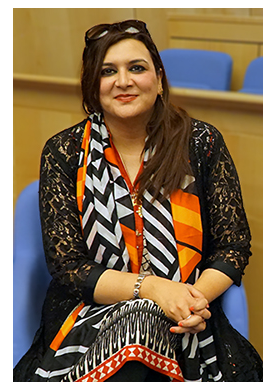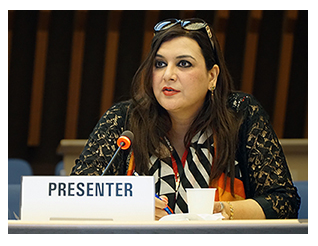Dr Razia Fatima’s passion to serve poor communities motivated her to pursue a medical degree and dedicate her career to tuberculosis (TB) control in Pakistan. Today she is a national champion for operational research to improve health and build a strong research network to End TB.
 Razia’s interest in TB grew from her experience as a medical doctor in a basic health unit in the rural Rawalpindi district in 2002: “Each day three or four people came to the health centre with TB symptoms but they were missed because we did not have the tools to detect the illness,” says Razia.
Razia’s interest in TB grew from her experience as a medical doctor in a basic health unit in the rural Rawalpindi district in 2002: “Each day three or four people came to the health centre with TB symptoms but they were missed because we did not have the tools to detect the illness,” says Razia.
In response, she led the creation of a rural DOTS centre for TB that was equipped and able to provide TB microscopy – a first-line diagnostic test in countries with high rates of TB infections – and care and treat patients.
“These were poor people living in slums with few basic services but I was determined to improve access to the interventions we knew would cure them and end the spread of TB,” she says.
The late Dr Lee Jong-wook, the WHO Director-General at the time, visited the TB DOTS centre in 2005 and was impressed by the centre and its services. He asked Razia if she would be interested in post-graduate training, with WHO support.
This career-changing moment enabled Razia to complete a master’s of science degree in epidemiology from the London School of Hygiene and Tropical Medicine, sparked her interest in health research, and led to a new role in the research unit of the national TB control programme in 2008.
The SORT IT experience
This attraction to research grew during her first SORT IT (Structured Operational Research and Training Initiative) course in 2010, which taught her the operational research process, the value of publishing and the use of publications as tools to drive health impact.
The SORT IT course model was launched in 2012 and builds on pre-existing work started by Médecins Sans Frontières (MSF) and the International Union Against Tuberculosis and Lung Disease (The Union) in 2009. TDR broadened the initiative to collaborate with national disease control programmes and WHO country offices worldwide to strengthen health systems.
Razia stands out as an example of what we want from SORT IT alumni, to influence the next generation of scientists in disease endemic countries to respond to local needs, to find practical answers to the problems that hold back health for all.
“I learned practical research skills and gained a mentor – Professor Donald Enarson, a leading lung health specialist and former scientist at The Union who led the course. He believed in finding local solutions to local problems,” says Razia.
Professor Enarson encouraged her to pursue her PhD using the skills attained in the course, and Dr Sven Gudmund Hinderaker, from the University of Bergen Norway, became her supervisor for a doctoral degree in public health.
“It was clear to me from the beginning that Razia had a passion for applying her skills and knowledge to help people with the least advantage. Although she could easily have chosen to enter private practice and enrich herself and her family she chose instead to dedicate herself to the neediest members of her community,” says Professor Enarson.
“She has brought immense knowledge and insight to her society through the practical research she has undertaken, encouraged and sponsored. She is a brilliant example of what all of us should aspire to be,” he adds.
 Since 2010, Razia has led and organized three SORT IT courses in Pakistan.
Since 2010, Razia has led and organized three SORT IT courses in Pakistan.
Researchers in the courses have published about 30 articles on a range of TB topics that have changed policies and practices in hospitals – to minimize missing TB cases and investigate under-reporting of adult and childhood TB in private health services, and improve infection control in facilities managing drug-resistant TB cases.
SORT IT is now acknowledged in Pakistan’s national strategic plan to End TB and there is a growing horizon of research publications for control of other infectious diseases, such as hepatitis, malaria, and HIV/AIDS, as well links to other programmes such as maternal and child health and infectious disease surveillance systems.
Rony Zachariah, TDR’s lead for SORT IT says: “Razia stands out as an example of what we want from SORT IT alumni, to influence the next generation of scientists in disease endemic countries to respond to local needs, to find practical answers to the problems that hold back health for all.”
Looking forward: embedding OR in national health programmes
Meanwhile, Razia’s interest in missing TB cases continues: “We need to find all the pools and pockets where TB is occurring and can spread – in public and private clinics, in the most remote health units to the larger hospitals,” she says.
Razia is convinced that operational research is essential for countries to battle infectious diseases of poverty – but sustaining the funding for this research is a challenge.
“I am grateful to TDR, the Global Fund (to Fight AIDS, Tuberculosis and Malaria) and The Union for their support for research capacity building in the country. My hope is to see the public health community in Pakistan embrace and embed this approach across our disease control programmes.
“Sustainable funding for quality research will bring us closer to the end of TB and other infectious diseases of poverty, in my country, and in similar health settings in the region,” she says.

